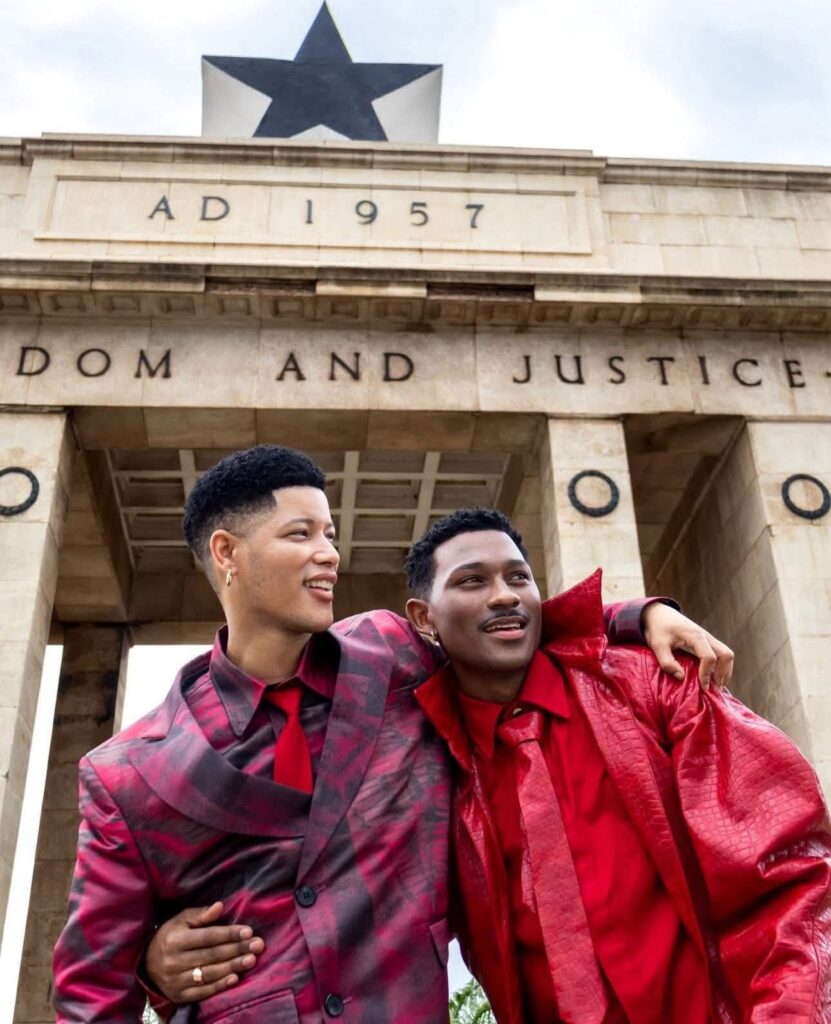A viral photo series by a South African queer couple taken at some of Ghana’s most iconic landmarks has ignited a storm of controversy and exposed a critical gap in regulation and oversight by the Ghana Tourism Authority (GTA). The images, part of a campaign dubbed “Show Ghana Love”, were taken at Independence Square, the Kwame Nkrumah Memorial Park, and the Aburi Botanical Gardens, showing the couple embracing and kissing in acts of public affection meant to show solidarity with Ghana’s queer community.
While the pair stated their intention was to respond to hate with love and raise awareness of the anti-LGBTQIA+ bill currently under consideration in Parliament, the reaction on social media has been swift and divided—ranging from supportive messages to homophobic attacks and calls for prosecution under Section 104 of Ghana’s Criminal Code, which criminalizes same-sex intimacy between men.
Many Ghanaians have expressed concern not just about the political message of the photos but about what they see as a violation of cultural and national respect. Critics argue that the same site managers who enforce strict dress codes, charge rising fees, and restrict photography for other visitors failed to prevent or address what they describe as provocative and inappropriate conduct at sacred national sites.
“How were these images captured at locations like the Independence Arch under the watch of caretakers who are quick to stop everyday tourists from less controversial acts?” one photographer questioned.
Amelley Djosu, a respected voice in cultural advocacy, has called on the Ghana Tourism Authority to take urgent steps to reinforce codes of conduct at national monuments. She emphasized the importance of protecting Ghana’s heritage sites from becoming battlegrounds for political or social activism that may disrupt public order or offend cultural sensibilities.
“Ghana’s landmarks belong to us all—but with that comes the duty to treat them with reverence, not as backdrops for controversy,” she said.
She urged the GTA to introduce:
- Clear visitor behavior guidelines at heritage sites
- Mandatory training for tour guides and security staff
- Swift enforcement and intervention protocols for rule violations
Djosu also cited global examples, such as the arrest of a German tourist in Mexico who climbed the ancient Maya temple at Chichen Itza, defying preservation laws. The worldwide backlash there, she argued, is a model Ghana can learn from.
While the campaign by Lue and Rue was intended to support Ghana’s queer community, critics say it may have backfired, further polarizing the debate and risking increased hostility toward LGBTQIA+ individuals.
Supporters of LGBTQIA+ rights stress the need for context-sensitive advocacy that respects local laws and cultural values while still challenging discrimination. As Ghana’s Parliament debates legislation that could criminalize advocacy and public expressions of queer identity, the stakes are high.
To avoid such flashpoints in the future, Djosu insists the GTA must take immediate action. Reinforcing protocols will ensure that Ghana’s monuments remain symbols of national pride—not sites of public outrage.
“Let our landmarks tell stories of unity, not division. That begins with ensuring they are treated with dignity by all who visit,” she concluded.

